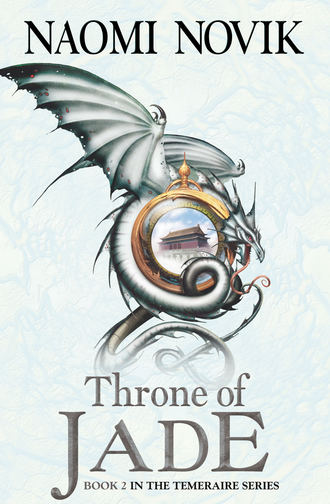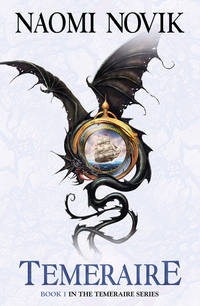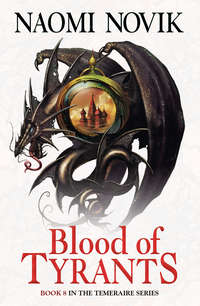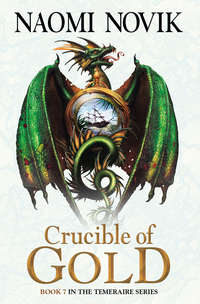
Полная версия
Throne of Jade
Laurence knew he was not doing his own part; but his knee was lodged up against a trestle of the table, preventing him from stretching out his now-aching leg, and though he had drunk as sparingly as was polite, his head felt thick and clouded. By now he only hoped he might avoid embarrassment, and resigned himself to making apologies to Riley after the meal for his dullness.
Riley’s third lieutenant, a fellow named Franks, had spent the first three toasts in rude silence, sitting woodenly and raising his glass only with a mute smile, but sufficient flow of wine loosened his tongue at last. He had served on an East Indiaman as a boy, during the peace, and evidently had acquired a few stumbling words of Chinese; now he tried the less-obscene of them on the gentleman sitting across from him: a young, clean-shaven man named Ye Bing, gangly beneath the camouflage of his fine robes, who brightened and proceeded to respond with his own handful of English.
‘A very— A fine—’ he said, and stuck, unable to find the rest of the compliment he wished to make, shaking his head as Franks offered, alternatively, the options which seemed to him most natural: wind, night, and dinner; at last Ye Bing beckoned over the translator, who said on his behalf, ‘Many compliments to your ship: it is most cleverly devised.’
Such praise was an easy way to a sailor’s heart; Riley, overhearing, broke off from his disjointed bilingual conversation with Hammond and Sun Kai, on their likely southward course, and called down to the translator, ‘Pray thank the gentleman for his kind words, sir; and tell him that I hope you will all find yourselves quite comfortable.’
Ye Bing bowed his head and said, through the translator, ‘Thank you, sir, we are already much more so than on our journey here. Four ships were required to carry us here, and one proved unhappily slow.’
‘Captain Riley, I understand you have gone round the Cape of Good Hope before?’ Hammond interrupted rudely, and Laurence glanced at him in surprise.
Riley also looked startled, but politely turned back to answer him, but Franks, who had spent nearly all of the last two days below in the stinking hold, directing the stowage of all the baggage, said in slightly drunken irreverence, ‘Four ships only? I am surprised it did not take six; you must have been packed like sardines.’
Ye Bing nodded and said, ‘The vessels were small for so long a journey, but in the service of the Emperor all discomfort is a joy, and in any case, they were the largest of your ships in Canton at the time.’
‘Oh; so you hired East Indiamen for the passage?’ Macready asked; he was the Marine lieutenant, a rail-thin, wiry stump of a man who wore spectacles incongruous on his much-scarred face. There was no malice but undeniably a slight edge of superiority in the question, and in the smiles exchanged by the naval men. That the French could build ships but not sail them, that the Dons were excitable and undisciplined, that the Chinese had no fleet at all to speak of, these were the oft-repeated bywords of the service, and to have them so confirmed was always pleasant, always heartening.
‘Four ships in Canton harbour, and you filled their holds with baggage instead of silk and porcelain; they must have charged you the earth,’ Franks added.
‘How very strange that you should say so,’ Ye Bing said. ‘Although we were travelling under the Emperor’s seal, it is true, one captain did try to demand payment, and then even tried to sail away without permission. Some evil spirit must have seized hold of him and made him act in such a crazy manner. But I believe your Company officials were able to find a doctor to treat him, and he was allowed to apologize.’
Franks stared, as well he might. ‘But then why did they take you, if you did not pay them?’
Ye Bing stared back, equally surprised to have been asked. ‘The ships were confiscated by Imperial edict. What else could they have done?’ He shrugged his shoulders, as if to dismiss the subject, and turned his attention back to the dishes; he seemed to think the piece of intelligence less significant than the small jam tartlets Riley’s cook had provided with the latest course.
Laurence abruptly put down knife and fork; his appetite had been weak to begin with, and now was wholly gone. That they could speak so casually of the seizure of British ships and property – the forced servitude of British seamen to a foreign throne— For a moment he almost convinced himself he had misunderstood: every newspaper in the country would have been shrieking of such an incident; the Government would surely have made a formal protest. Then he looked at Hammond: the diplomat’s face was pale and alarmed, but unsurprised; and all remaining doubt vanished as Laurence recalled Barham’s sorry behaviour, so nearly grovelling, and Hammond’s attempts to change the course of the conversation.
Comprehension was only a little slower in coming to the rest of the British, running up and down the table on the backs of low whispers, as the officers murmured back and forth to one another. Riley’s reply to Hammond, which had been going forward all this time, slowed and stopped: though Hammond prompted Riley again, urgently, asking, ‘Did you have a rough crossing of it? I hope we do not need to fear bad weather along the way.’ This came too late; a complete silence fell, except for young Tripp chewing noisily.
Garnett, the master, elbowed the boy sharply, and even this sound failed. Sun Kai put down his wine glass and looked frowning up and down along the table; he had noticed the change of atmosphere: the feel of a brewing storm. There had already been a great deal of hard drinking, though they were scarcely halfway through the meal, and many of the officers were young, and flushing now with mortification and anger. Many a Navy man, cast on shore during an intermittent peace or by a lack of influence, had served aboard the ships of the East India Company; the ties between Britain’s Navy and her merchant marine were strong, and the insult all the more keenly felt.
The translator was standing back from the chairs with an anxious expression, but most of the other Chinese attendants had not yet perceived. One laughed aloud at some remark of his neighbour’s: it made a queer solitary noise in the cabin.
‘By God,’ Franks said, suddenly, out loud, ‘I have a mind to—’
His seat-mates caught him by the arms, hurriedly, and kept him in his chair, hushing him with many anxious looks up towards the senior officers, but other whispers grew louder. One man was saying, ‘—sitting at our table!’ to snatches of violent agreement; an explosion might come at any moment, certainly disastrous. Hammond was trying to speak, but no one was attending to him.
‘Captain Riley,’ Laurence said, harshly and over-loud, quelling the furious whispers, ‘will you be so good as to lay out our course for the journey? I believe Mr. Granby was curious as to the route we would follow.’
Granby, sitting a few chairs down, his face pale under his sunburn, started; then after a moment he said, ‘Yes, indeed; I would take it as a great favour, sir,’ nodding to Riley.
‘Of course,’ Riley said, if a little woodenly; he leaned over to the locker behind him, where his maps lay: bringing one onto the table, he traced the course, speaking somewhat more loudly than normal. ‘Once out of the Channel, we must swing a ways out to skirt France and Spain; then we will come in a little closer and keep to the coastline of Africa as best we can. We will put in at the Cape until the summer monsoon begins, perhaps a week or three depending on our speed, and then ride the wind all the way to the South China Sea.’
The worst of the grim silence was broken, and slowly a thin obligatory conversation began again. But no one now said a word to the Chinese guests, except occasionally Hammond speaking to Sun Kai, and under the weight of disapproving stares even he faltered and was silent. Riley resorted to calling for the pudding, and the dinner wandered to a disastrous close, far earlier than usual.
There were Marines and seamen standing behind every sea-officer’s chair to act as servants, already muttering to each other; by the time Laurence regained the deck, pulling himself up the ladderway more by the strength of his arms than by properly climbing, they had gone out, and the news had gone from one end of the deck to the other, the aviators even speaking across the line with the sailors.
Hammond came out onto the deck and stared at the taut, muttering groups of men, biting his lips to bloodlessness; the anxiety made his face look queerly old and drawn. Laurence felt no pity for him, only indignation: there was no question that Hammond had deliberately tried to conceal the shameful matter.
Riley was beside him, not drinking the cup of coffee in his hand, boiled if not burnt, by the smell of it. ‘Mr. Hammond,’ he said, very quiet but with authority, more authority than Laurence, who for most of their acquaintance had known him as a subordinate, had ever heard him use; an authority which quite cleared away all traces of his ordinary easy-going humour, ‘pray convey to the Chinamen that it is essential they stay below; I do not give a damn what excuse you like to give them, but I would not wager tuppence for their lives if they came on this deck now. Captain,’ he added, turning to Laurence, ‘I beg you send your men to sleep at once; I don’t like the mood.’
‘Yes,’ Laurence said, in full understanding: men so stirred could become violent, and from there it was a short step to mutiny; the original cause of their rage would not even necessarily matter by then. He beckoned Granby over. ‘John, send the fellows below, and have a word with the officers to keep them quiet; we want no disturbance.’
Granby nodded. ‘By God, though—’ he said, hard-eyed with his own anger, but he stopped when Laurence shook his head, and went. The aviators broke up and went below quietly; the example might have been of some good, for the sailors did not grow quarrelsome when ordered to do the same. Then, also, they knew very well that their officers were in this case not their enemies: anger was a living thing in every breast, shared sentiment bound them all together, and little more than mutters followed when Lord Purbeck, the first lieutenant, walked out upon the deck among them and ordered them below in his drawling, affected accent. ‘Go along now, Jenkins; go along, Harvey.’
Temeraire was waiting on the dragondeck with head raised high and eyes bright; he had overheard enough to be on fire with curiosity. Having had the rest of the story, he snorted and said, ‘If their own ships could not have carried them, they had much better have stayed home.’ This was less indignation at the offence than simple dislike, however, and he was not inclined to great resentment; like most dragons, he had a very casual view of property, saving, of course, jewels and gold belonging to himself: even as he spoke he was busy polishing the great sapphire pendant which Laurence had given him, and which he never removed save for that purpose.
‘It is an insult to the Crown,’ Laurence said, rubbing his hand over his leg with short, pummelling strokes, resentful of the injury; he wanted badly to pace. Hammond was standing at the quarterdeck rail smoking a cigar, the dim red light of the burning embers flaring with his inhalations, illuminating his pale and sweat-washed face. Laurence glared at him along the length of the near-empty deck, bitterly. ‘I wonder at him; at him and at Barham, to have swallowed such an outrage, with so little noise: it is scarcely to be borne.’
Temeraire blinked at him. ‘But I thought we must at all costs avoid war with China,’ he said, very reasonably, as he had been lectured on the subject without end for weeks, and even by Laurence himself.
‘I should rather settle with Bonaparte, if the lesser evil had to be chosen,’ Laurence said, for the moment too angry to consider the question rationally. ‘At least he had the decency to declare war before seizing our citizens, instead of this cavalier offhand flinging of insults in our face, as if we did not dare to answer them. Not that Government have given them any reason to think otherwise: like a pack of damned curs, rolling over to show their bellies. And to think,’ he added, smouldering, ‘that scoundrel was trying to persuade me to kowtow, knowing it should be coming after this—’
Temeraire gave a snort of surprise at his vehemence, and nudged him gently with his nose. ‘Pray do not be so angry; it cannot be good for you.’
Laurence shook his head, not in disagreement, and fell silent, leaning against Temeraire. It could do no good to vent his fury so, where some of the men left on deck might yet overhear and take it as encouragement to some rash act, and he did not want to distress Temeraire. But much was suddenly made plain to him: after swallowing such an insult, of course the Government would hardly strain at handing over a single dragon; the entire Ministry would likely be glad to rid themselves of so unpleasant a reminder, and to see the whole business hushed up all the more thoroughly.
He stroked Temeraire’s side for comfort. ‘Will you stay above deck with me a while?’ Temeraire asked him, coaxing. ‘You had much better sit down and rest, and not fret yourself so.’
Indeed Laurence did not want to leave him; it was curious how he could feel his lost calm restore itself under the influence of that steady heartbeat beneath his fingers. The wind was not too high, at the moment, and not all of the night watch could be sent below; an extra officer on the deck would not be amiss. ‘Yes, I will stay; in any case I do not like to leave Riley alone with such a mood over the ship,’ he answered, and went limping for his wraps.
Chapter Four
The wind was freshening from the northeast, very cold; Laurence stirred out of his half-sleep and looked up at the stars: only a few hours had passed. He huddled deeper into his blankets by Temeraire’s side and tried to ignore the steady ache in his leg. The deck was strangely quiet; under Riley’s grim and watchful eye there was scarcely any conversation at all among the remaining crew, though occasionally Laurence could hear indistinct murmurs from the rigging above, men whispering to each other. There was no moon, only a handful of lanterns on deck.
‘You are cold,’ Temeraire said unexpectedly, and Laurence turned to see the great deep-blue eyes studying him. ‘Go inside, Laurence; you must get well, and I will not let anyone hurt Riley. Or the Chinese, I suppose, if you would not like it,’ he added, though without much enthusiasm.
Laurence nodded, tiredly, and heaved himself up again; the moment of danger was over, he thought, at least for the moment, and there was no real sense in his staying above. ‘You are comfortable enough?’
‘Yes, with the heat from below I am perfectly warm,’ Temeraire said; indeed Laurence could feel the warmth of the dragondeck even through the soles of his boots.
It was a great deal more pleasant in out of the wind; his leg stabbed unpleasantly twice as he climbed down to the upper berth deck, but his arms were up to his weight and held him until the spasm passed; he managed to reach his cabin without falling.
Laurence had several pleasant small round windows, not draughty, and near the ship’s galley as he was, the cabin was still warm despite the wind; one of the runners had lit the hanging lantern, and Gibbon’s book was lying still open on the lockers. He slept almost at once, despite the pain; the easy sway of his hanging cot was more familiar than any bed, and the low susurration of the water along the sides of the ship a wordless and constant reassurance.
He came awake all at once, breath jolted out of his body before his eyes even quite opened: noise more felt than heard. The deck abruptly slanted, and he flung out a hand to keep from striking the ceiling; a rat went sliding across the floor and fetched up against the fore lockers before scuttling into the dark again, indignant.
The ship righted almost at once: there was no unusual wind, no heavy swell; at once he understood that Temeraire had taken flight. Laurence flung on his boat-cloak and rushed out in nightshirt and bare feet; the drummer was beating to quarters, the crisp flying staccato echoing off the wooden walls, and even as Laurence staggered out of his room the carpenter and his mates were rushing past him to clear away the bulkheads. Another crash came: bombs, he now recognized, and then Granby was suddenly at his side, a little less disordered since he had been sleeping in breeches. Laurence accepted his arm without hesitation and with his help managed to push through the crowd and get back up to the dragondeck through the confusion. Sailors were running with frantic haste to the pumps, flinging buckets out over the sides for water to slop onto the decks and wet down the sails. A bloom of orange-yellow was trying to grow on the edge of the furled mizzen topsail; one of the midshipmen, a spotty boy of thirteen Laurence had seen skylarking that morning, flung himself gallantly out onto the yard with his shirt in his hand, dripping, and smothered it out.
Конец ознакомительного фрагмента.
Текст предоставлен ООО «ЛитРес».
Прочитайте эту книгу целиком, купив полную легальную версию на ЛитРес.
Безопасно оплатить книгу можно банковской картой Visa, MasterCard, Maestro, со счета мобильного телефона, с платежного терминала, в салоне МТС или Связной, через PayPal, WebMoney, Яндекс.Деньги, QIWI Кошелек, бонусными картами или другим удобным Вам способом.







